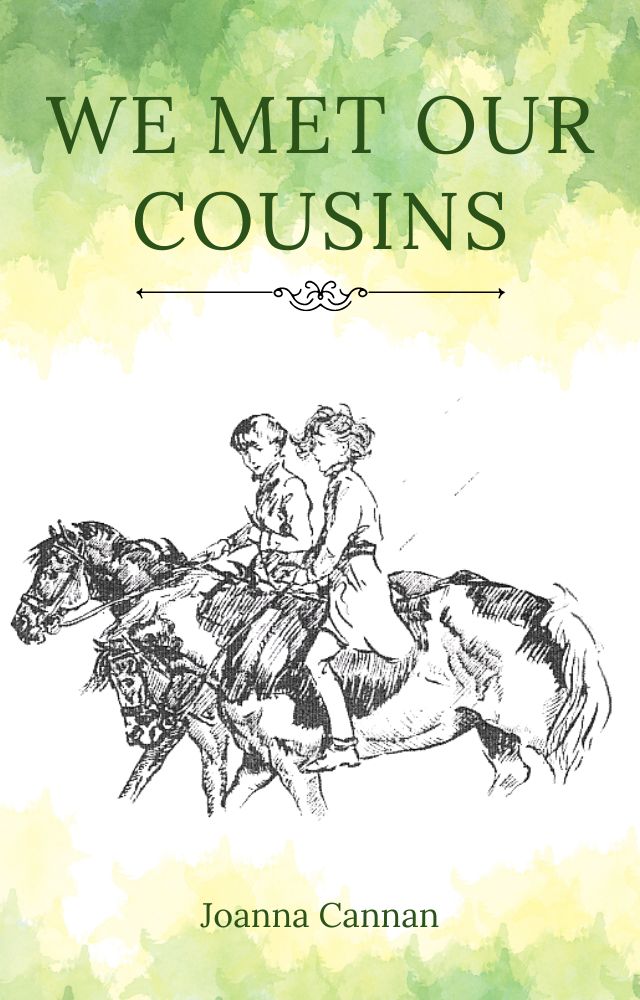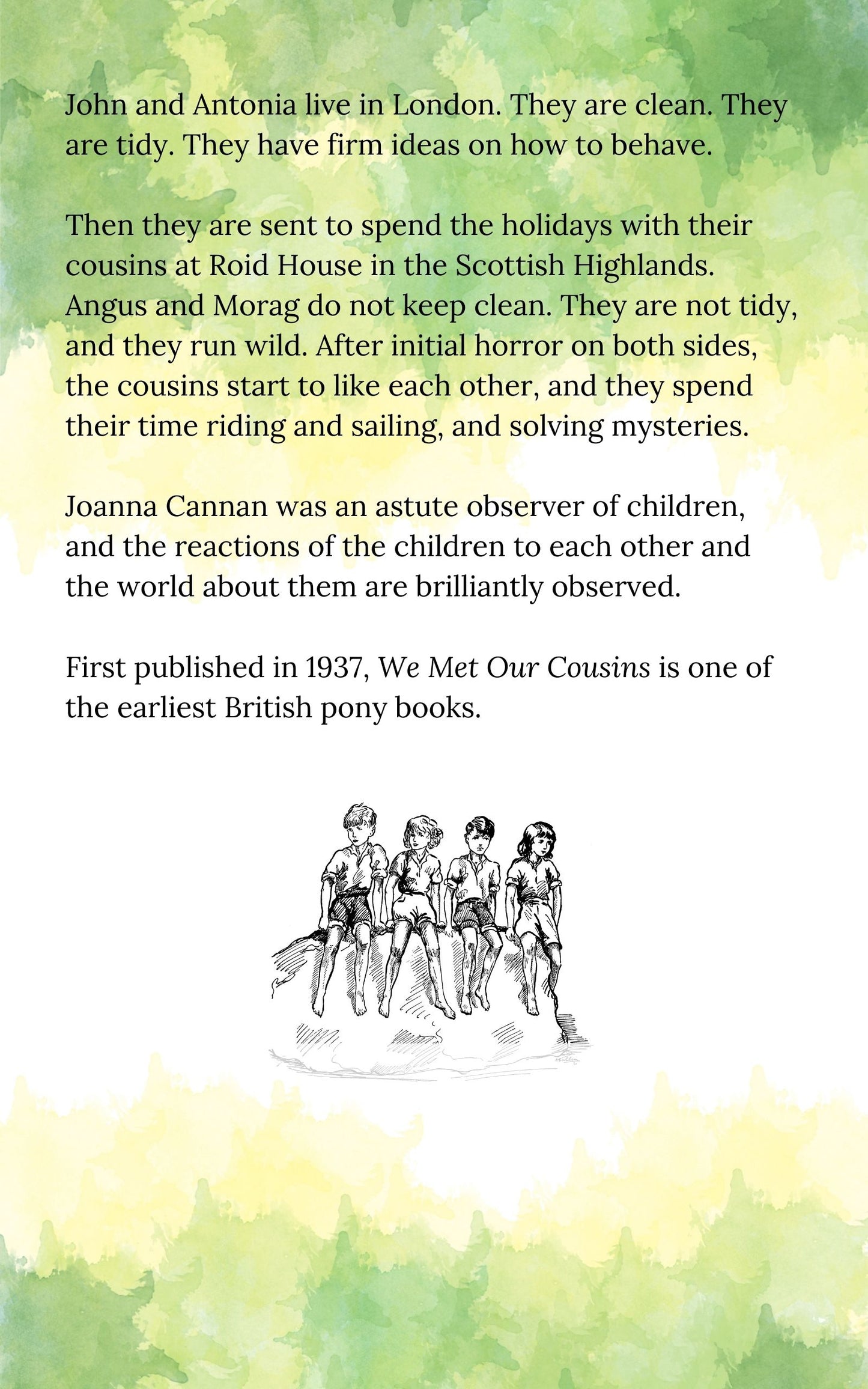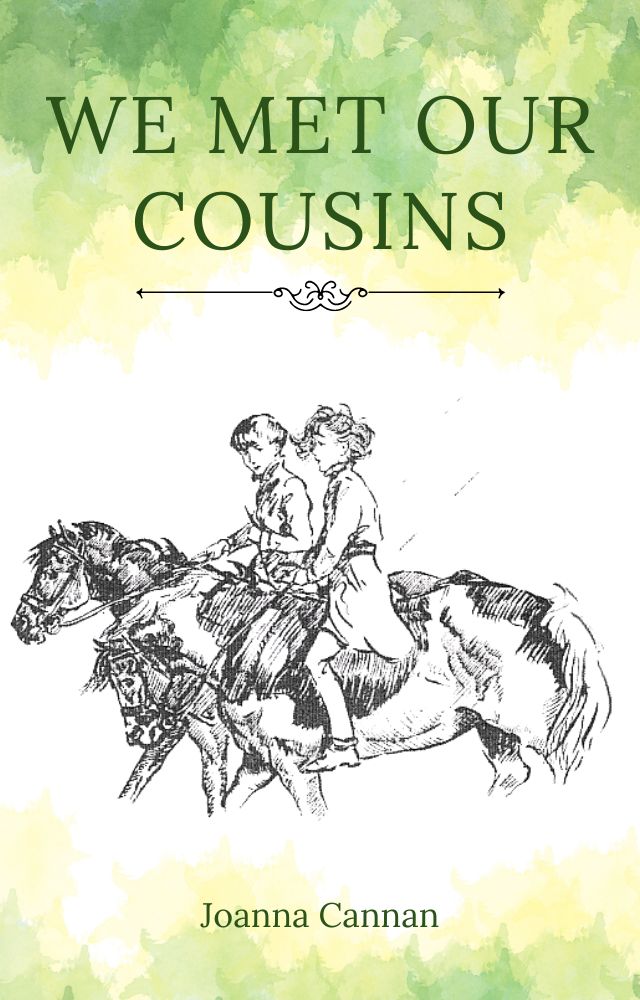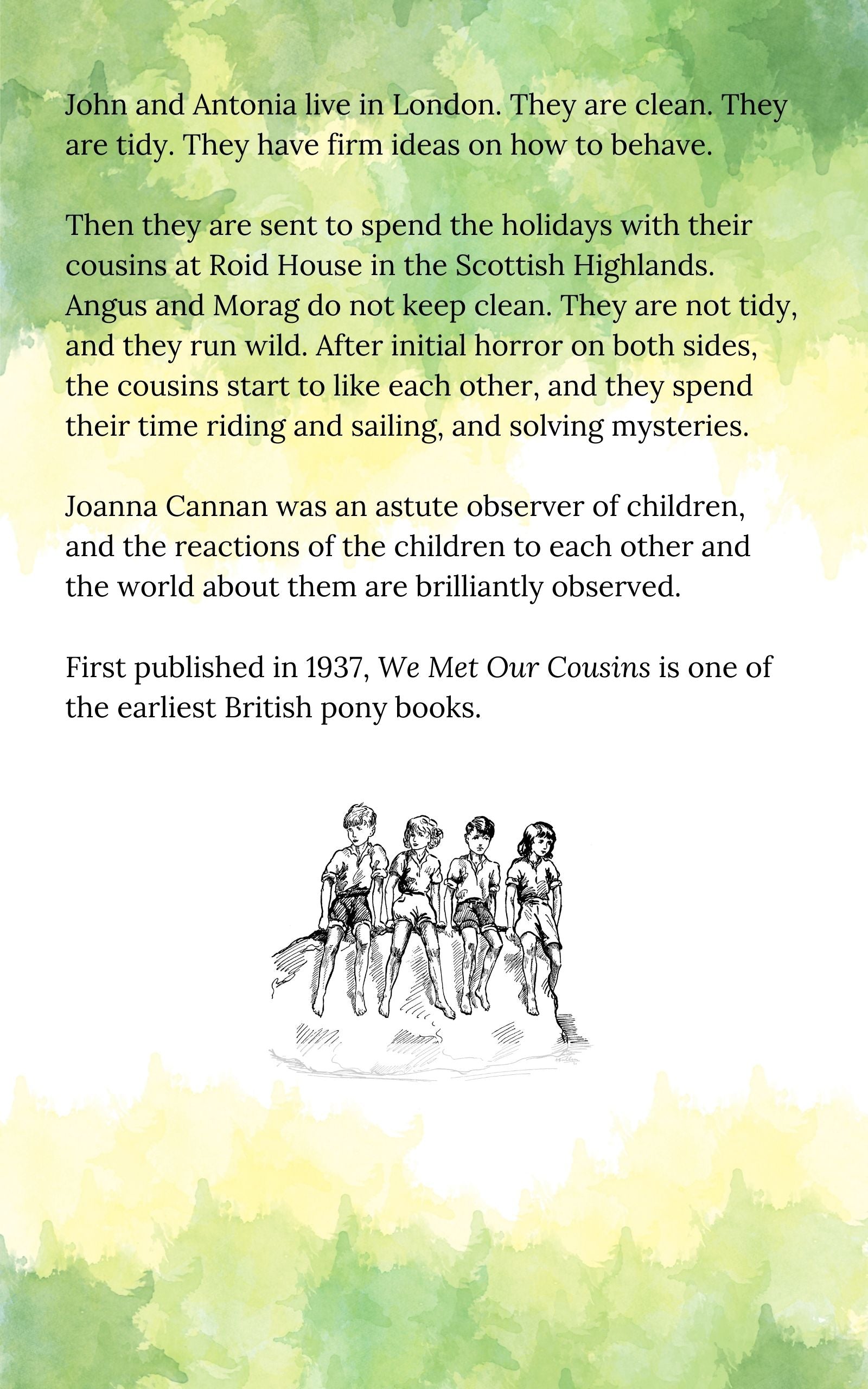Jane Badger Books
Joanna Cannan: We Met Our Cousins (eBook - Cousins 1)
Joanna Cannan: We Met Our Cousins (eBook - Cousins 1)
Couldn't load pickup availability
Share
First published in 1937, We Met Our Cousins is one of the earliest British pony books.
John and Antonia live in London. They are clean. They are tidy. They have firm ideas on how to behave. Then they are sent to spend the holidays with their cousins at Roid House in the Scottish Highlands. The cousins are nothing like John and Antonia, and run wild. After initial horror on both sides, the cousins start to like each other, and they spend their time riding and sailing, and solving the odd mystery on the side.
Joanna Cannan was an astute observer of children, and the reactions of the children to each other and the world about them are brilliantly observed.
Cousins series 1
Page length: 137
Original publication date: 1937
How do I get my book?
How do I get my book?
There's a link to download in your confirmation email. If you need help, the email from Bookfunnel, who handle our delivery, will walk you through downloading the file that works best for you.
How do I read my eBook?
How do I read my eBook?
You can read the ebooks on any ereader (Amazon, Kobo, Nook), your tablet, phone, computer, and/or in the free Bookfunnel app.
Read a sample
Read a sample
IT wasn’t until nearly at the end of the summer term that John and I were told about our summer holidays. We don’t live with our own father and mother because Daddy is a major in the Indian Army and his regiment is stationed at a very hot and awful place called Quetta; we live in London with Uncle Gerald and Aunt Pamela, and Aunt Pamela is the sort of person who doesn’t tell you things beforehand in case you should get excited.
John and I had lived with her for so long that we were used to her cautious habits and didn’t realise how much we were missing, but now that I know how lovely it is to have something exciting to think about when you are in bed or doing arithmetic, I have decided that when I have children of my own I shall tell them everything.
It was Robin’s nurse who told us. Robin is Aunt Pamela’s child and, as Aunt Pamela and our mother are sisters, he is our first cousin. He is younger than we are and we are always made to give in to him; even when he steps on my farmyard things Nanny says that it is my fault for spreading them out so, and, of course, that makes him think that he can step anywhere and even pull his beastly wooden train straight over my beautiful hedges.
It may be good for you to give in to people, but I must say it does not improve the people you give in to.
We were walking in Kensington Gardens when Nanny told us. John and I had been quarrelling. All the other years, Aunt Pamela had taken a house at Frinton for the summer holidays, and John and I had had riding lessons there from a Mr. Catchpole. Mr. Catchpole had a pony called Sweetbriar that we both liked best, and now John suddenly said that he was bagging Sweetbriar for the first ride. I said that you couldn’t bag things so long beforehand, and John said, all right, then, it didn’t matter because he was the eldest so he would have first choice anyway.
I couldn’t say that he ought to give in to me because I am younger, because that would have been like Robin, so I said, “You’re just like a boy—always bagging and winning.”
John said, “Well, I’m glad I’m not a mewing girl in a chip straw hat with dear little forget-me-nots round it.” It was jolly mean of him because he knew I hated that hat, so I said nothing but silently cow-kicked at him. I got him on the shin and he gave a shriek of agony and turned round with a furious face and pushed me, and I fell backwards over a small iron railing into a herbaceous border.
Nanny was walking ahead, holding Robin’s hand, as she always does in case he should fall down or blow away or something, and so far she hadn’t heard anything; but now, of course, she heard the crash of my fall and the snapping off of the herbaceous plants as I sat on them. She rushed back with a horrified face, dragging Robin along with her.
“Antonia!” she shrieked out. “You naughty girl, whatever on earth are you doing? Look at those flowers! Look at your lovely frock, clean on this morning! Get up quick! The park-keeper’s coming.”
She always says that the park-keeper is coming, so I didn’t hurry. I got up, but the poor flowers didn’t. I tried to straighten a squashed lupin, but Nanny wouldn’t let me. She hurried away from the scene of the crime though she is always telling us not to be deceitful.
As she hurried, she went on at me. It was like my luck that the herbaceous border had just been watered; my frock was all wet and earthy at the back and she said who would have the trouble of washing it, and that I looked like a tramp, and that here were Lady Montgomery’s nice well-behaved children and what would their Nanny think of me? John said, “Oh, do shut up. It wasn’t Tony’s fault. I pushed her,” and then Nanny said that we were both rude tiresome children and why couldn’t we walk nicely like Robin and thank goodness she wouldn’t be bothered with us this year at Frinton.
I said, “Why not?” For one awful moment I thought that perhaps the people at school had been complaining again about my arithmetic and that we were to have a holiday governess. Nanny said, “Because you’re not coming.”
“What rot,” said John. I suppose he was thinking that it was an empty threat, like the park-keeper.
“Don’t speak like that, John,” said Nanny. “I don’t tell lies, if you do.”
“I don’t,” said John.
“But Nanny,” I said politely, “please tell us where we are going.”
“You don’t deserve to go nowhere,” said Nanny.
“We can’t be left in the shut-up house. Even the cat goes to the vet,” said John sarcastically.
“You’re going to an awful dull place, I can tell you that,” said Nanny. “No promenade, no pier, no sands, no tennis tournaments—nowhere to go and nothing to see but rain and rocks and great horrible mountains. I shouldn’t want to go there, I know. I should soon give my notice in if Mrs. Cadogan suggested it.”
“What do you say when you give your notice in?” asked John, who always will go off on other subjects.
Nanny said that was none of his business, and they had an argument that lasted as far as the gate into Palace Gardens. When they had finished, I said, “Where is the awful place, Nanny?”
“It’s in Scotland,” she said, and she added darkly, “I’m sure I don’t know how John will get on with the porridge.”
We always have porridge for breakfast and John hates it. He sits and looks at it until Nanny goes to make the beds and then sometimes I eat it for him and sometimes he empties it out of the window and it goes slithering down the side of the house into the gutter on the roof of the conservatory.
John said, “I shan’t eat it.”
“You’ll have to,” said Nanny. “The old gentleman is much more strict than your Aunt Pamela.”
“What old gentleman?” I asked her.
“Your great-uncle, of course,” said Nanny. “Professor MacAlister. You’ll have to mind your p’s and q’s, I can tell you.”
Then we knew. Mummy and Aunt Pamela had another sister called Marian, and she had married a Scotsman called Hector MacAlister. Aunt Marian and Uncle Hector lived in China, where they were trying to restore the fallen fortunes of the MacAlisters, and their children lived with Uncle Hector’s father in the ancestral home in the Highlands of Scotland. They were our first cousins, like Robin, but we had never seen them because old Professor MacAlister disapproved of things like London and cinemas and motor-cars and would not let them leave the ancestral home; and Aunt Pamela never talked about them because she was annoyed that Aunt Marian had not sent them to live with her and be brought up properly like us and Robin. We used to send them Christmas cards, so we knew that their names were Angus, Morag and Hamish, and that their address was Roid House, Kinlochroid, Scotland; but they never sent any cards back. Nanny said it was because Roid House was thirty miles from the nearest shops and she doubted if they had ever been inside one. She said that if they ever did come to London, people would think them half-witted.
Of course John and I did not want to go and stay with a strict Professor and half-witted cousins in a place where it always rained and you ate nothing but porridge, and I thought of the sands at Frinton and Mr. Catchpole’s ponies, and I must say I felt very miserable. John said, “I shan’t go,” and Nanny said, “You’ll have to,” and by then we were at the front door, so we couldn’t ask any more questions.
At tea, John bagged the last meringue finger and Nanny gave it to Robin, so they had an argument about fairness, and then we washed and went down to the drawing-room. When Aunt Pamela is in, she reads to us after tea. It is rather dull because the books she reads have to be suitable for Robin, so they are much too young for us, and John gets bored and makes faces at me or ties reef knots and bowlines on bights in string out of his pockets.
To-day the story was about a princess, who had three suitors, and they had to go out and do noble acts and she would marry the one who did the noblest. One of them conquered a kingdom, and one sailed over the sea and found a new country, and the third carried an old woman’s basket, and, of course, that was the noblest act and the princess married him. When Aunt Pamela shut the book up, John, who was kicking the leg of his chair though he had been told three times not to, said, “What a feeble story!”
“How can you say so, John,” said Aunt Pamela in a shocked voice. “It was written by one of our greatest modern poets.”
John said, “Gosh! I thought it was written by an old lady. He must be a very sloppy kind of poet. Couldn’t you read us something by Ballantyne or Henty?”
“Oh, John,” said Aunt Pamela, “you are old-fashioned. Perhaps, after all, you’ll get on all right where you’re going for your summer holidays.”
Then she told us about going to Scotland. We didn’t say that we knew already, because we both had a feeling that perhaps Nanny hadn’t been meant to tell us. When Aunt Pamela had finished, John said, “Why are we being sent there?”
“Your mother thinks it will do you good,” said Aunt Pamela rather crossly.
Our hearts sank. It sounded like medicine or museums.
Aunt Pamela said, “I only hope that being with your cousins won’t make you more tiresome than you are already. Especially you, John. The poor little things have had no proper bringing up—no nice Nanny to look after them or dancing classes or pantomimes. I believe they are very rough wild children. You must write and tell me if they bully you.”
We did feel awful. I stayed awake a long time that night thinking of Roid House and imagining what it was like. I imagined a tall gloomy house like barracks, standing under a black stony mountain; and rain pouring down all day; and the stern professor, who would give one glance from under his bushy black eyebrows and John would eat up his porridge. I imagined our three rough wild cousins chasing us about the house and pinching and hitting us, and I must say I did wish then that we hadn’t been so tiresome. For a bit I wondered whether, supposing we promised faithfully never to be tiresome again, Mummy would change her mind and let us go to Frinton, but then I thought that if we did make a promise like that, we should never be able to keep it, because the tiresome things we do really aren’t our fault: we can’t help our hair sticking up, and our feet clumping on the stairs, and always falling down when our clothes are clean, and having loud voices. It’s all very well for Robin—his hair curls, and his voice doesn’t shout naturally, and he doesn’t fall down because some one always takes his hand and says, “Come along, darling…”
Actually, the next day being Sunday, I did write to Mummy, but I didn’t make any rash promises. I only said need we go to Scotland and I was sorry we were always so tiresome. After the letter had gone I realised that, of course, she wouldn’t even get it until long after we were in Scotland, but I thought that perhaps she would send a telegram to say that we could come back, and so shorten our miseries. Later on in the story you will hear what Mummy said in answer to my letter.
Who's in the book?
Who's in the book?
Human: Antonia, John, Morag, Angus, Robin, Aunt Pamela, the MacAlister, Hugheena, Hamish
Equine: Bonnie Dundee, Seagull, Lizzie Lindsay, Swallow
London Pride
Other titles published as
Other titles published as
Series order
Series order
1. We Met Our Cousins
2. London Pride




